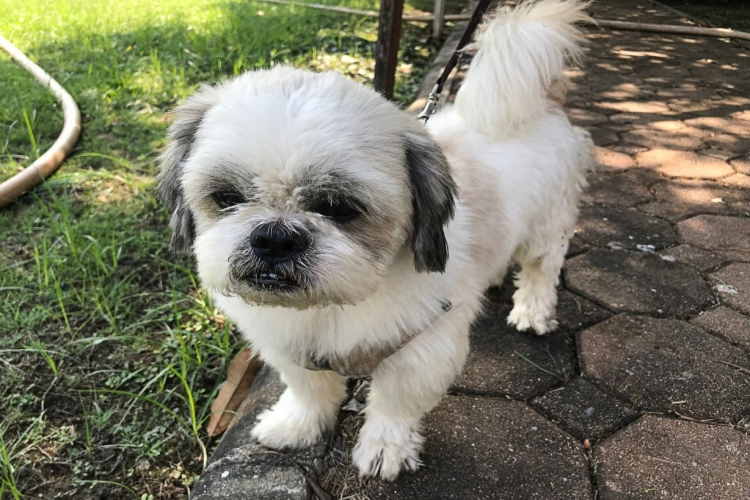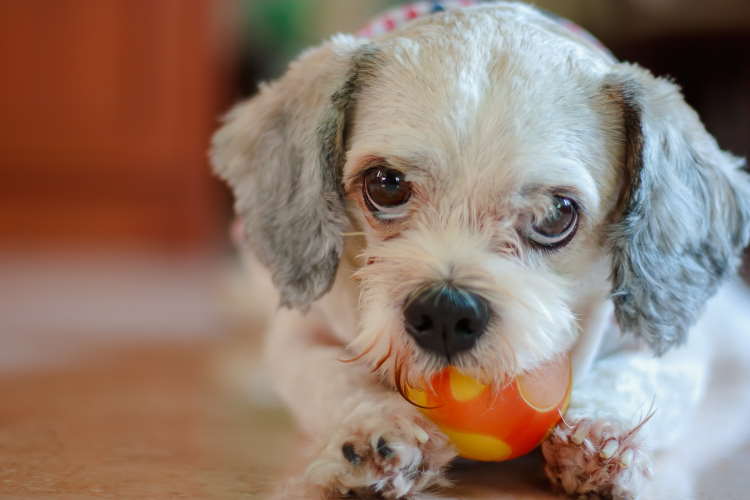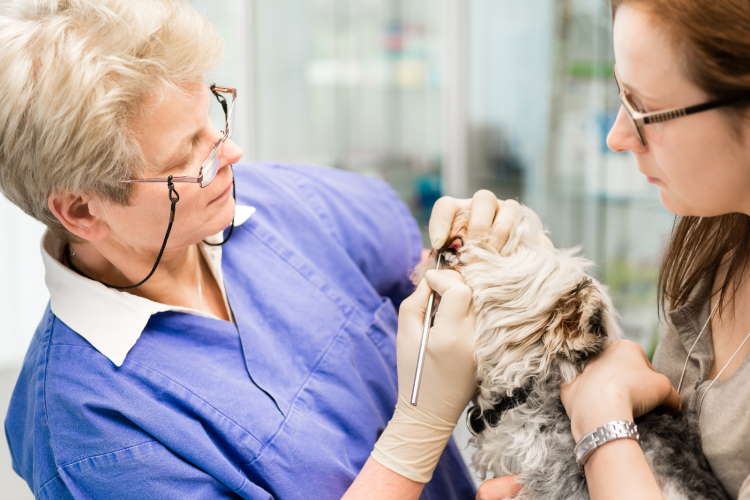- Home
- Shih Tzu Information
- senior Shih Tzu needs
Senior Shih Tzu: The Changing needs of your Senior Shih Tzu
WRITTEN BY STACY | EVERYTHINGSHIHTZU.COM
Whether you adopt an older dog or you’ve had your faithful friend by your side for many years, a senior dog needs some special love and care.
You might notice your pup slowing down, sleeping more often, maybe not eating as much, and other changes in behavior.
Most of these shifts are normal, and as your pup ages, it’s essential to know what your senior Shih Tzu needs to stay happy and healthy.

Changes Your senior Shih Tzu goes through as they get older
There are many things that will change when your Shih Tzu enters their senior years (about 9 or 10 years old).
You might notice things like cloudy eyes, not hearing as well, not moving as fast, loss of stamina, lumps, and even weight gain. It’s essential to recognize that this doesn’t mean your pup can’t still enjoy life; you just need to help them do it in a different way.
You’ll need to make adjustments to your dog’s diet, exercise routine and likely make some changes with how you have your pup’s space set up inside and outside the home.
Adjust Your Shih Tzu’s Environment
If your pup is having difficulty seeing and hearing, keeping their surroundings the same is essential.
Find a place where they feel safe and comfortable and set up their bed. Ensure it’s on the floor since your pup isn’t going to be doing a lot of jumping these days.
Likewise, keep your pup’s food and water in the same place, so they always know where to find it.
Older dogs also struggle to regulate their body temperature, so ensure your pup has access to a warm space.
Keep a cozy blanket in their dog bed and when the weather gets chilly, consider a doggy sweater for when you take your pup outside.
If your pup’s mobility is declining, a doggy ramp can help with getting in and out over a raised stoop. Or, if your dog still sleeps in your bed, you can get a doggy ramp for that.
However, keep in mind that as your dog’s vision declines, the likelihood of falling off the bed increases.
A bad fall can lead to serious injury, so it might be safer for you to get your pup used to sleeping on the floor next to your bed. Or, you can always try bed rails, similar to the ones used for toddlers, if you can’t bear not having your furry friend in the bed.
Puppy-Proof Your Home...Again
You might find that as your Shih Tzu ages, you start worrying about some of the same things you did when your dog was a puppy, like having potty accidents or getting hurt. Therefore, go around your home and re-puppy proof.
Limit your dog’s access to rooms in the house, move tripping hazards, tie-up cords and cables, and consider getting your pal a doggy diaper if they’re having incontinence issues.
You can also place potty pads near the back door or wherever you usually bring your pup for bathroom breaks.
Sometimes, your dog might try to make it outside but just can’t get there fast enough.
If you at one point had a doggy door, it might be time to close it up if your pal is having hearing and seeing issues. However, some dogs adapt very well to this loss in the senses, so trust your gut.
If you decide to keep the doggy door a bit longer, it’s imperative to ensure you don’t make any changes in your backyard area.
Plus, always make sure all gates are securely locked and there are no potential escape points, like holes under the fence.

Provide Appropriate Physical Activity
As your dog ages, you’ll undoubtedly notice a decrease in their energy and activity levels, but it’s still important that your pup get some exercise.
Still go for walks, but prepare to shorten the duration.
You can also try doing some light play sessions with your Shih Tzu. Monitor your dog carefully during these times of activity and adjust the routine as needed.
Increase Vet Visits and Care

When your dog becomes a senior, you might want to discuss upping your annual well visits with your vet.
Many veterinarians recommend senior dogs have a check-up every 6 months instead of yearly since older dogs tend to have weaker immune systems.
It’s also critical to keep up with proper dental cleanings and your dog’s oral health.
There is also special bloodwork your vet will likely want to perform to keep on the lookout for any possible issues. This is because things can happen more rapidly as your dog gets older, and early detection can make a big difference in successful treatment.
Adjust Your Senior Shih Tzu’s Food
A nutritious diet is necessary for a dog of any age, but it’s especially vital to pay close attention to what your senior Shih Tzu eats.
There are several dog foods designed specifically for senior dogs, so you can start by asking your vet if one of these might be a better fit for your aging pup.
Since older dogs tend to decrease their physical activity, weight gain is also a likely result. Therefore, you could also consider dog foods that help with weight management.
Aging pups might also deal with sensitive teeth, and it can become difficult for them to eat hard kibble. You can switch to wet food, or you can simply soften their existing dry food.
All you need to do is place some warm water in their food bowl and let it sit for a few moments. The food will soak up the water and become softer and easier for your pal to chew.
Consider Supplements
Very much like aging, humans need a helping hand in the nutrition department, so do many dogs. As your Shih Tzu ages, you’ll notice changes in their hair and skin, plus they might struggle with sore joints.
Things like Omega-3 fatty acids are a vital component of your dog’s nutrition, but they might not get everything they need from their food as they get older.
Supplements can help, so ask your vet about ones that might be a good match for your pup.
When your Shih Tzu enters their golden years, you can still enjoy many fun and memorable times together.
However, it’s just more important than ever to keep a watchful eye on your precious pup and pay close attention to any changes in their behavior and habits.
If you’re ever concerned about something, don’t hesitate to discuss it with your vet so you can take the appropriate steps.
- Home
- Shih Tzu Information
- senior Shih Tzu needs



